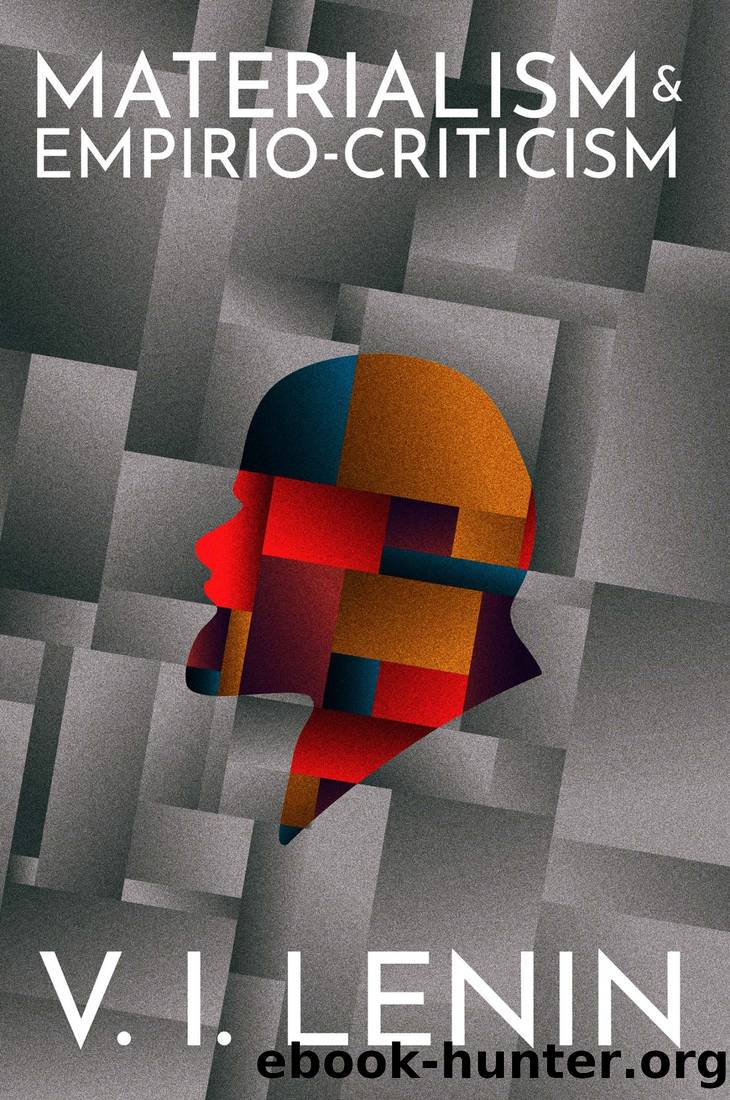Materialism and Empirio-Criticism by Vladimir I. Lenin

Author:Vladimir I. Lenin [Lenin, Vladimir I.]
Language: eng
Format: epub
Tags: Philosophy : Political
ISBN: 9780835101516
Google: ZZ9XPwAACAAJ
Publisher: China Books & Periodicals, Incorporated
Published: 1986-11-15T00:09:14.621536+00:00
From the standpoint of the straightforward and unmuddled Machism which Mach openly advocated in 1872, it is indisputable that if molecules, atoms, in a word, chemical elements, cannot be perceived, they are âmere thoughtâ (das bloss Gedachte). If so, and if space and time have no objective reality, it is obvious that it is not essential to think of atoms spatially! Let physics and chemistry ârestrict themselvesâ to a three-dimensional space in which matter moves; for the explanation of electricity, however, we may seek its elements in a space which is not three-dimensional!
That our Machians should circumspectly avoid all reference to this absurdity of Machâs, although he repeats it in 1906 (Knowledge and Error, 2. Auflage, p. 418), is understandable, for otherwise they would have to raise the question of the idealist and materialist views of space point-blank, without evasions and without attempting to âreconcileâ these antagonistic positions. It is likewise understandable that in the seventies, when Mach was still entirely unknown and when âorthodox physicistsâ even refused to publish his articles, one of the chiefs of the immanentist school, Anton von Leclair, should eagerly have seized upon precisely this argument of Machâs as a noteworthy renunciation of materialism and recognition of idealism! For at that time Leclair had not yet invented, or had not yet borrowed from Schuppe and Schubert-Soldern, or J. Rehmke, the ânewâ sobriquet, âimmanentist schoolâ, but plainly called himself a critical idealist.[12] This unequivocal advocate of fideism, who openly preached it in his philosophical works, immediately proclaimed Mach a great philosopher because of these statements, a ârevolutionary in the best sense of the wordâ (p. 252); and he was absolutely right. Machâs argument amounts to deserting science for fideism. Science was seeking, both in 1872 and in 1906, is now seeking, and is discovering â at least it is groping its way towards â the atom of electricity, the electron, in three-dimensional space. Science does not doubt that the substance it is investigating exists in three-dimensional space and, hence, that the particles of that substance, although they be so small that we cannot see them, must also ânecessarilyâ exist in this three-dimensional space. Since 1872, during the course of three decades of stupendous and dazzling scientific successes in the problem of the structure of matter, the materialist view of space and time has remained âharmlessâ, i.e., compatible, as heretofore, with science, while the contrary view of Mach and Co. was a âharmfulâ capitulation to the position of fideism.
In his Mechanik, Mach defends the mathematicians who are investigating the problem of conceivable spaces with n dimensions; he defends them against the charge of drawing âpreposterousâ conclusions from their investigations. The defence is absolutely and undoubtedly just, but see the epistemological position Mach takes up in this defence. Recent mathematics, Mach says, has raised the very important and useful question of a space of n dimensions as a conceivable space; nevertheless, three-dimensional space remains the only âreal caseâ (ein wirklicher Fall). (3rd German ed., pp. 483-85.) In vain,
Download
This site does not store any files on its server. We only index and link to content provided by other sites. Please contact the content providers to delete copyright contents if any and email us, we'll remove relevant links or contents immediately.
| Africa | Americas |
| Arctic & Antarctica | Asia |
| Australia & Oceania | Europe |
| Middle East | Russia |
| United States | World |
| Ancient Civilizations | Military |
| Historical Study & Educational Resources |
Machine Learning at Scale with H2O by Gregory Keys | David Whiting(4292)
Never by Ken Follett(3937)
Fairy Tale by Stephen King(3369)
Oathbringer (The Stormlight Archive, Book 3) by Brandon Sanderson(3149)
The Man Who Died Twice by Richard Osman(3070)
Will by Will Smith(2906)
Rationality by Steven Pinker(2351)
Can't Hurt Me: Master Your Mind and Defy the Odds - Clean Edition by David Goggins(2320)
The Dark Hours by Michael Connelly(2300)
Friends, Lovers, and the Big Terrible Thing by Matthew Perry(2219)
The Dawn of Everything: A New History of Humanity by David Graeber & David Wengrow(2187)
Principles for Dealing With the Changing World Order: Why Nations Succeed and Fail by Ray Dalio(2035)
A Short History of War by Jeremy Black(1842)
HBR's 10 Must Reads 2022 by Harvard Business Review(1838)
Go Tell the Bees That I Am Gone by Diana Gabaldon(1748)
A Game of Thrones (The Illustrated Edition) by George R. R. Martin(1717)
Kingdom of Ash by Maas Sarah J(1667)
515945210 by Unknown(1660)
443319537 by Unknown(1544)
